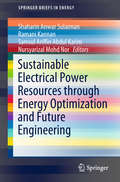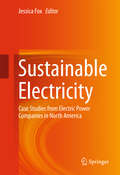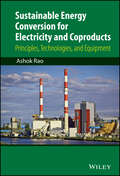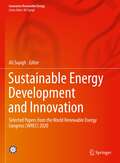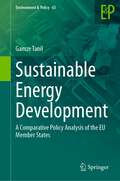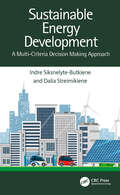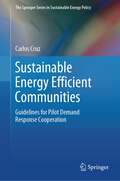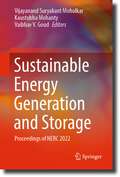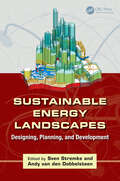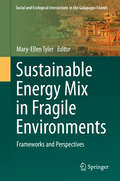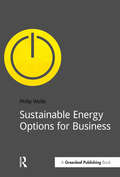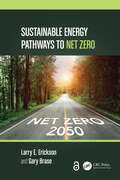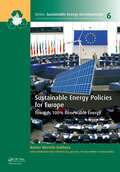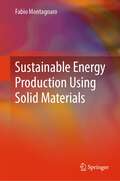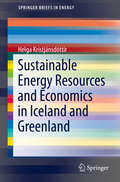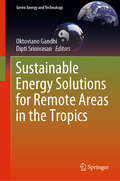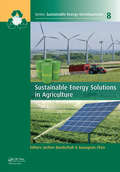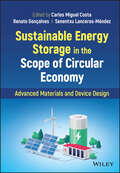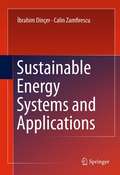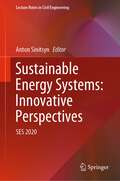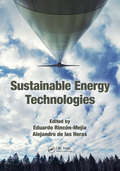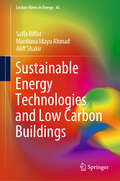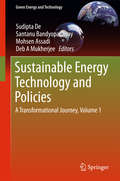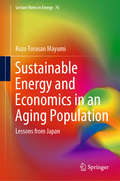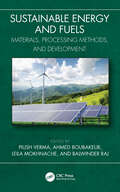- Table View
- List View
Sustainable Electrical Power Resources through Energy Optimization and Future Engineering (SpringerBriefs in Energy)
by Shaharin Anwar Sulaiman Ramani Kannan Samsul Ariffin Karim Nursyarizal Mohd NorThis book presents recent science and engineering research in the field of conventional and renewable energy, energy efficiency and optimization, discussing problems such as availability, peak load and reliability of sustainable supply for power to consumers. Such research is imperative since efficient and environmentally friendly solutions are critical in modern electricity production and transmission.
Sustainable Electricity
by Jessica FoxThis resource is the first-ever compilation of industry-authored case studies on how power companies are making strides toward achieving sustainable electricity in North America. The book features recent game changing efforts, candid insider stories about challenges and process, and forecasts for the next decade of innovation. Each chapter shares topic-focused case studies regarding the reality of implementing operational changes and strategies that will lead to sustainable electricity. Key technical staff and managers from top companies candidly report on failures, insights, trade-offs, internal process, resulting improvements to operational efficiencies, and natural resource and stakeholder benefits. Electric power company managers seeking to identify specific opportunities and understand the process for advancing sustainability in their own organizations will discover solid paths forward through potentially treacherous terrain. Educated stakeholders, agencies, and regulators will benefit from the greater understanding of the reality of realizing change in the electric power industry engendered by this unique strategic resource.
Sustainable Energy Conversion for Electricity and Coproducts
by Ashok RaoProvides an introduction to energy systems going on to describe various forms of energy sources Provides a comprehensive and a fundamental approach to the study of sustainable fuel conversion for the generation of electricity and for coproducing synthetic fuels and chemicals Covers the underlying principles of physics and their application to engineering including thermodynamics of combustion and power cycles, fluid flow, heat transfer, and mass transfer Details the coproduction of fuels and chemicals including key equipment used in synthesis and specific examples of coproduction in integrated gasification combined cycles are presented Presents an introduction to renewables and nuclear energy, including a section on electrical grid stability and is included due to the synergy of these energy plants with fossil-fueled plants
Sustainable Energy Development and Innovation: Selected Papers from the World Renewable Energy Congress (WREC) 2020 (Innovative Renewable Energy)
by Ali SayighThis book contains selected papers presented during the World Renewable Energy Congress (WREC) 2020 at the Instituto Superior Técnico in Lisbon. The WREC is dedicated to promoting renewable energy global development, and features top international experts, policy makers, scientists, engineers, technology developers, and business practitioners addressing the most current research and technological breakthroughs in sustainable energy development and innovation. The contributions address policy and renewable energy technologies and applications in all sectors—for heating and cooling, agricultural applications, water, desalination, industrial applications, and for the transport sectors.Presents cutting-edge research in green building and renewable energy from all over the world;Covers the most up-to-date research developments, government policies, business models, best practices, and innovations;Contains case studies and examples to enhance practical application of the technologies.
Sustainable Energy Development: A Comparative Policy Analysis of the EU Member States (Environment & Policy #63)
by Gamze TanilThis book investigates how the EU member states’ domestic energy policies have transformed in the last two decades as a consequence of horizontal and vertical integration forces. Integration is a dynamic process where member states adopt community rules, norms, and values, and meanwhile, learn from each other’s experiences. Today, Europe experiences an energy transition from fossil-fuels to cleaner sources of energy and European policy makers are committed to taking this significant step forward. Domestic structural change is, thus, observed in all member states‘ environmental and energy policies. This book presents an overview of the EU norms, legislation, and policy standards for renewable energies and analyses how member states transpose them into their domestic structure. The book also analyses the policy outcomes in the EU member states in a comparative perspective by using the most recent statistical data. This comparative analysis gives insight to investors and developers to decide on investment projects and/or manufacturing of renewable energy devices to these countries. It also provides a useful reference for policy makers, academics, students, and NGOs who need a quick overview of relevant national and EU legislation, policy standards, and policy outcomes.
Sustainable Energy Development: A Multi-Criteria Decision Making Approach
by Dalia Štreimikienė Indre Siksnelyte-ButkieneSustainable Energy Development: A Multi-Criteria Decision Making Approach discusses sustainable energy development, the main path for achieving carbon neutrality, and the use of multi-criteria decision making (MCDM) in assessing energy transition in both operational and socio-political forms. It proposes ways to support responsible decision making toward sustainable energy in key areas such as power distribution, household energy, and transportation. The authors have developed frameworks and tools to help choose sustainable energy options like renewable energy technologies, energy efficiency improvements, policies, and how to promote them in different communities. The book includes several case studies focused on electricity, district heating, transport sectors in the European Union (EU), and decision making in the household sector. Features Analyzes the connection between sustainable energy development and the transition toward a carbon neutral society. Compares and discusses advanced MCDM tools to support sustainable energy options. Develops new frameworks of indicators for the assessment of sustainable regional and national energy system planning, and provides practical illustrative examples in various energy sectors. Provides policy implications when promoting sustainable energy development. Presents case studies on the applications of multi-criteria tools to support sustainable energy options in different energy sectors. Readers interested in gaining insight into leading trends in energy efficiency and sustainability, such as academics, researchers, graduate students, and professionals interested in sustainable energy and energy producers, city planners, policy makers, and more, will benefit from the topics and frameworks discussed in this book.
Sustainable Energy Efficient Communities: Guidelines for Pilot Demand Response Cooperation (The Springer Series in Sustainable Energy Policy)
by Carlos CruzThis book analyses issues surrounding the efficient integration of demand response programmes in residential communities. It also explores the benefits and energy efficiency co-ordination corresponding to demand response service in a cooperative system. The author explains how sensors, communication technologies, computational ability, and control can be effectively combined to create a demand planification system. Smart appliances (SAs) and other connected devices, together with smart communities (SCs)—which enable energy consumers to pursue common goals through cooperation and coordinated behaviour within the framework of the Internet of things (IoT)—have raised expectations regarding deployment of the information and communication technologies (ICTs) to encourage uptake of demand response (DR) energy efficiency programmes. DR programmes pursue a reduced carbon footprint, balanced supply and demand, and behavioural change in consumers. The book provides sustainable evidence of ICT-supported energy management that can help consumers flexibly manage demand through the formation of sustainable SCs that maximise renewable energy use through large-scale cooperative management mechanisms. SCs cooperating securely in identifying consumption patterns can foster sustainable and efficient energy use, with the outcome of benefits for the participants and for the environment.
Sustainable Energy Generation and Storage: Proceedings of NERC 2022
by Vaibhav V. Goud Vijayanand Suryakant Moholkar Kaustubha MohantyAs India progresses fast in the 21st century, we also face daunting challenges of energy security and climate change. Tremendous development in various sectors like industry, agriculture, transport has resulted in huge rise in demand for energy. Fulfilling these demands through conventional fossil fuel based energy generation has given rise to significant emissions (both gaseous and liquids) that have caused pollution to atmosphere and aquatic eco-systems. Use of sustainable and green (or renewable) resources and technologies offers a viable and promising solutions to these issues. Last two decades have witnessed intense research activities in Indian academic institutions on renewable energy resources. These include biofuels (both liquid and gaseous) through thermochemical and biochemical conversion of biomass, solar energy through thermal and photo-voltaic routes, wind energy and hydroelectric energy. North-East Research Conclave (NERC) – 2022 was organized by Indian Institute of Technology Guwahati with aim of bringing together researchers in diverse fields of science and technology and provide a knowledge-sharing platform to achieve sustainable development goals. This monograph contains papers presented in the session on Sustainable Energy Generation and Storage in NERC. A total of 16 papers in this monograph cover wide areas in renewable energy. The contents of this monograph will of interest to students and researchers in academic institutions as well as industry.
Sustainable Energy Landscapes: Designing, Planning, and Development
by Sven Stremke Andy van den DobbelsteenIn the near future the appearance and spatial organization of urban and rural landscapes will be strongly influenced by the generation of renewable energy. One of the critical tasks will be the re-integration of these sustainable energy landscapes into the existing environment-which people value and want to preserve-in a socially fair, environmenta
Sustainable Energy Mix in Fragile Environments: Frameworks and Perspectives (Social and Ecological Interactions in the Galapagos Islands)
by Mary-Ellen TylerThe purpose of this book is to present a range of cases and comparison of the issues, insights and cases emerging from the Sustainable Energy Mix Summit in the Galapagos that offer a better understanding of energy mix in fragile environments from a variety of International locations and contexts including the Galapagos.
Sustainable Energy Options for Business (Doshorts Ser.)
by Philip WolfeThe major environmental impact of most businesses derives from energy usage. The upside of this is that using energy more responsibly improves profitability. A business’s cheapest unit of energy is also the one which is least damaging to the planet: the unit you don't use.There are many ways to make your organization's energy usage more sustainable. In Sustainable Energy Options for Business, Philip Wolfe outlines the best available options for (1) reducing energy use and (2) improving the sustainability of energy supply. After an introduction to regulatory drivers and management issues, Wolfe looks at energy opportunities in five key areas: 1. Saving on energy usage; 2. Finding more sustainable sources of energy; 3. Generating renewable electricity; 4. Producing renewable heat; 5. Indirect energy sustainability options.Also included: An "energy checklist" to help identify your best options and important quick wins, plus a handy reference list, signposted from annotations in the text.
Sustainable Energy Pathways to Net Zero
by Larry E. Erickson Gary BraseSustainable Energy Pathways to Net Zero addresses realistic pathways between now and 2050 to reach net zero: a steady state concentration of greenhouse gases in the atmosphere. It discusses solar and wind energy, hydrogen, energy storage, and electric vehicles, all of which are becoming an increasingly cost-efficient part of these pathways. Hydrogen, the price of electricity, the integration of different sources of electricity into the electrical grid, and the electric vehicle charging networks are crucial in balancing supply and demand. This book describes how these different energy factors fit together. It emphasizes the fact that the intersection of these technologies is where the most profound advances can occur.Features: Emphasizes the importance of demand management for electricity and reducing cost. Explains the economics of reaching net zero emissions and the role of innovation and public policies, among others. Discusses the cost and efficiency of solar and wind power, electric vehicles, and storage technologies, and describes the benefits of battery swapping. Focuses on the role of integration of different sources of electricity into the electrical grid as an important part of the pathway. Recommends research and development on electrochemical processes to remove carbon from the ocean. Written in a simple language for a general audience and understandable for a global market. Is Open Access to encourage global use. This book is a great resource for government and industry professionals involved in energy production and management, as well as academics and students in science and engineering interested in the pathways to sustainable development. The Open Access version of this book, available at http://www.taylorfrancis.com, has been made available under a Creative Commons Attribution-Non Commercial-No Derivatives (CC-BY-NC-ND) 4.0 license.
Sustainable Energy Policies for Europe: Towards 100% Renewable Energy (ISSN #6)
by Rainer Hinrichs-RahlwesThe discussion about energy perspectives up to 2050 and beyond has started. There seems to be consensus that ambitious climate change mitigation policies are necessary, whereas proposed solutions vary from aiming at 100% renewable energies and setting up appropriate policy frameworks to a mix of renewables with so-called clean fossil and nuclear energy. Provides an analysis of the different approaches and the reasons why there is no sustainable alternative to aiming at 100% renewables and how this vision could come true. An overview and in-depth analysis of a vital debate, describing policy options and their impact on Renewable Energy development and deployment in Europe.
Sustainable Energy Production Using Solid Materials
by Fabio MontagnaroThis textbook focuses on sustainable energy production using solid materials. With explanatory tables and figures, case studies, worked-out examples, and up-to-date bibliographies of other works, the book provides an in-depth exploration of the most innovative aspects of the field.Readers of the book will gain critical skills in characterizing and reacting to biomass, including the formation of pollutants, as well as using fluidized bed reactors for heterogeneous processes. The book also explores innovative methods for mitigating the greenhouse effect, reusing ashes as adsorbents or in cement production, and thermochemical solar energy storage. This book will give students, novice researchers, and industry professionals valuable insights and knowledge into the sustainable production of energy using solid materials.
Sustainable Energy Resources and Economics in Iceland and Greenland
by Helga KristjánsdóttirThis book provides fascinating examples of the ways renewable and sustainable energy can support economic growth, which will be illuminating for academic researchers and students, as well as those interested in green investment opportunities. The distinctive glacial, volcanic and oceanic environments of Iceland and Greenland supply abundant renewable energy resources in the form of hydropower and geothermal energy. As one of the few nations in the world with 100% renewable electricity production, Iceland is a compelling case study of a sustainable energy driven economy. Consideration of Greenland provides an interesting contrast, as its enormous potential for hydropower scale-up has only been minimally harnessed. The variable and fixed cost factors governing further expansion and export of the regions' sustainable power via sub-sea cable are detailed.
Sustainable Energy Solutions for Remote Areas in the Tropics (Green Energy and Technology)
by Oktoviano Gandhi Dipti SrinivasanThis book covers multifaceted aspects of sustainable energy solutions for remote areas in the tropics, particularly focusing on Southeast Asia. With insights from both the academic world and real-life implementation, readers will gain an overview of the range of energy problems currently facing the remote tropics, and what potential solutions are available. The book provides a detailed overview of various energy needs in the Southeast Asian tropics, a region where a significant portion of the population still lives without access to electricity. It not only addresses technical solutions to the energy problems but also tackles the social and wider implications, offering readers a more holistic understanding of the potential held by renewable energy. The chapters are structured to present first an overview of the problem at hand, and then a description of the technologies that could potentially solve it. Applications of the technologies; business models that are now available or being developed; the impact of the technologies; and future, more sustainable solutions are all discussed. Given its in-depth analysis, the book will be of interest to energy professionals in the tropics, energy policymakers, and students studying sustainable energy.
Sustainable Energy Solutions in Agriculture (Sustainable Energy Developments)
by Jochen BundschuhSustainability in agriculture and associated primary industries, which are both energy-intensive, is crucial for the development of any country. Increasing scarcity and resulting high fossil fuel prices combined with the need to significantly reduce greenhouse gas emissions, make the improvement of energy efficient farming and increased use of rene
Sustainable Energy Storage in the Scope of Circular Economy: Advanced Materials and Device Design
by Senentxu Lanceros-Méndez Carlos Miguel Costa Renato GonçalvesSustainable Energy Storage in the Scope of Circular Economy Comprehensive resource reviewing recent developments in the design and application of energy storage devices Sustainable Energy Storage in the Scope of Circular Economy reviews the recent developments in energy storage devices based on sustainable materials within the framework of the circular economy, addressing the sustainable design and application of energy storage devices with consideration of the key advantages and remaining challenges in this rapidly evolving research field. Topics covered include: Sustainable materials for batteries and fuel cell devices Multifunctional sustainable materials for energy storage Energy storage devices in the scope of the Internet of Things Sustainable energy storage devices and device design for sensors and actuators Waste prevention for energy storage devices based on second life and recycling procedures With detailed information on today’s most effective energy storage devices, Sustainable Energy Storage in the Scope of Circular Economy is a key resource for academic researchers, industrial scientists and engineers, and students in related programs of study who wish to understand the state of the art in this field.
Sustainable Energy Systems and Applications
by Calin Zamfirescu Ibrahim DincerThe concept of sustainable development was first introduced by the Brundtland Commission almost 20 years ago and has received increased attention during the past decade. It is now an essential part of any energy activities. This is a research-based textbook which can be used by senior undergraduate students, graduate students, engineers, practitioners, scientists, researchers in the area of sustainable energy systems and aimed to address some key pillars: better efficiency, better cost effectiveness, better use of energy resources, better environment, better energy security, and better sustainable development. It also includes some cutting-edge topics, such hydrogen and fuel cells, renewable, clean combustion technologies, CO2 abatement technologies, and some potential tools (exergy, constructal theory, etc.) for design, analysis and performance improvement.
Sustainable Energy Systems: SES 2020 (Lecture Notes in Civil Engineering #141)
by Anton SinitsynThis book gathers the latest advances, innovations, and applications in the field of sustainable energy systems, as presented by researchers and engineers at the International Conference Sustainable Energy Systems: Innovative Perspectives (SES), held in Saint-Petersburg, Russia, on October 29-30, 2020. It covers highly diverse topics, including applications of renewable energy sources, recycling of solid municipal and industrial waste, circular economy based on agricultural waste, energy-efficient and sustainable buildings, innovation management and technologies of sustainable cities, sustainable construction, creative construction technology and materials, construction simulation and virtual construction, BIM and rapid prototyping for construction, consumption practices in the digital era, sustainable operations management, and supply chain management in the digital era. The contributions, which were selected by means of a rigorous international peer-review process, highlight numerous exciting ideas that will spur novel research directions and foster multidisciplinary collaborations.
Sustainable Energy Technologies
by Eduardo Rincón-Mejía Alejandro de las HerasThis book examines the key aspects that will define future sustainable energy systems: energy supply, energy storage, security and limited environmental impacts. It clearly explains the need for an integrated engineering approach to sustainable energies, based on mathematical, biogeophysical, and engineering arguments. Resilient and efficient alternatives are compared to non-sustainable options. This book results from the collaboration of 50 international contributors.
Sustainable Energy Technologies and Low Carbon Buildings (Lecture Notes in Energy #45)
by Mardiana Idayu Ahmad Saffa Riffat Aliff ShakirThis book aims to offer an in-depth guide and fundamental comprehension of sustainable energy technologies and their essential function in decreasing energy consumption in buildings under diverse climatic conditions. It has been designed to stimulate additional research and innovation, especially in the field of green technology for building applications. This book embodies the culmination of extensive research and case studies, encompassing the initial developments to the latest advancements in sustainable energy systems, particularly emphasising energy-efficient building technologies. It also highlights up-to-date reviews and research into meeting low and zero carbon demand in buildings and includes extensive coverage of established and emerging sustainable energy technologies for building applications, addressing their physical principles, mechanisms, applications, and cutting-edge technological advances. The coverage of book is divided into five main parts: Thermal energy-efficient systems; Sustainable power generation; Energy-efficient lighting technologies; Zero-energy and low carbon buildings and; Eco-cities as sustainable urban living. Taken together, they provide a concise explanation of low and zero carbon buildings’ role in tackling the world’s energy challenges, with an emphasis on design, conversion techniques, and materials and on the economic and environmental assessment of technology. Innovative concepts, design, and planning in connection with global urbanization and improving sustainable development are also discussed. In addition, the book features case studies on worldwide sustainable energy technologies, low and zero carbon buildings, and eco-cities as sustainable urban environments. This book offers a valuable source of information for developers, architects, building managers and owners, and engineers working in sustainable energy fields, as it provides in-depth information on a diverse range of technologies designed to achieve environmentally friendly solutions. The book also benefits students and academics, as it offers optimal supporting material for an introductory course in this field.
Sustainable Energy Technology and Policies: A Transformational Journey, Volume 1 (Green Energy And Technology)
by Sudipta De Santanu Bandyopadhyay Mohsen Assadi Deb A MukherjeeThis book presents an integrated approach to sustainably fulfilling energy requirements, considering various energy-usage sectors and applicable technologies in those sectors. It discusses smart cities, focusing on the design of urban transport systems and sources of energy for mobility. It also shares thoughts on individual consumption for ensuring the sustainability of energy resources and technologies for emission reductions for both mobility and stationary applications. For the latter, it examines case studies related to energy consumption in the manufacturing sector as well as domestic energy requirements. In addition it explores various distribution and policy aspects related to the power sector and sources of energy such as coal and biomass. This book will serve as a valuable resource for researchers, practitioners, and policymakers alike.
Sustainable Energy and Economics in an Aging Population: Lessons from Japan (Lecture Notes in Energy #76)
by Kozo Torasan MayumiThis book discusses current challenges in Japan, focusing on the nation’s rapidly aging population and low birth rate, along with persistent public bond issues with heavy interest payments, the potential collapse of social security systems, and income inequality, as well as the global picture. In turn, it examines the accessibility of global fossil fuels and feasibility of large-scale solar energy use. A new theory of money, interest, and capital is put forward, together with a proposal for an alternative system of international monetary cooperation, to promote a more sustainable and equitable world. Specific topics discussed include • the inverted population pyramid, due to the dramatic change in human life spans and declining birth rates; • the rapidly shrinking workforce, aging population, and declining GDP share sourced from industry; • disproportionate debt expansion due to public bond issues and coping with a persistent budget deficit; • the potential collapse of social security systems combined with income inequality; and • how to mitigate these bio-economic predicaments. Global Energy Sources offers an essential guide for policymakers, economists, researchers, and all those concerned with establishing a sustainable and equitable society from both energy and monetary perspectives. Further, it will be of interest to readers around the world, as the lessons learned from Japan are crucial to other developed societies that may eventually face the same types of challenge.
Sustainable Energy and Fuels: Materials, Processing Methods, and Development
by Piush Verma, Ahmed Boubakeur, Leila Mokhnache, and Balwinder RajSustainability refers to the concept that all people should be able to meet their basic needs indefinitely, without compromising future generations. Sustainability, in terms of energy, embraces the same principles. One day the world will run out of fossil fuels. We need to realize how important sustainable energy is and its significance when it comes to the future of our planet. Sustainable energy includes any energy source that cannot be depleted and can remain viable forever. It does not need to be renewed or replenished; sustainable energy meets our demand for energy without any risk of failing or running out. This is why sustainable energy is the answer to our energy needs. Furthermore, sustainable energy doesn’t harm the environment (or at most, there is a minimal risk), increase climate change, or cost a heavy price. Although there is a cost associated with creating and building ways to capture sustainable energy, the energy sources themselves are typically free. The main objective of this book is to provide an up-to-date review of conduction mechanisms, structure construction, operation, performance evaluation, and applications of various renewable energies and fuels. The current trend in innovation is likely to explore the potential to connect novel materials, design methods, and new techniques, which would allow us to maintain existing resources and develop new methods by employing smart technologies. This book provides a complete insight into recent advancements in nanomaterials, renewable energy design, and applications. The purpose of this book is to provide relevant theoretical frameworks that include materials, modeling, circuit design, and the latest developments in experimental work in the field of renewable energy and fuels.This book: Presents solar energy conversion including photovoltaics and artificial photosynthesis Discusses important topics such as energy management standards, biofuels, biorefining, and capacitive desalination Illustrates the importance of novel materials and process improvements for sustainable energy and fuels Includes research problem statements with specifications and commercially available industry data Covers catalysis for energy technologies, including the sustainable synthesis of fuels and chemicals, molecular, and bioinspired catalysis The text is primarily written for senior undergraduates and graduate students, and academic researchers in the fields of electrical engineering, electronics and communication engineering, environmental engineering, and renewable energy.
